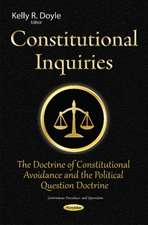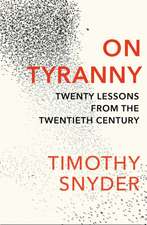The Politics of Corruption in Dictatorships
Autor Vineeta Yadav, Bumba Mukherjeeen Limba Engleză Paperback – 29 dec 2015
| Toate formatele și edițiile | Preț | Express |
|---|---|---|
| Paperback (1) | 263.79 lei 43-57 zile | |
| Cambridge University Press – 29 dec 2015 | 263.79 lei 43-57 zile | |
| Hardback (1) | 545.88 lei 43-57 zile | |
| Cambridge University Press – 29 dec 2015 | 545.88 lei 43-57 zile |
Preț: 263.79 lei
Nou
Puncte Express: 396
Preț estimativ în valută:
50.48€ • 52.83$ • 42.01£
50.48€ • 52.83$ • 42.01£
Carte tipărită la comandă
Livrare economică 31 martie-14 aprilie
Preluare comenzi: 021 569.72.76
Specificații
ISBN-13: 9781107443778
ISBN-10: 1107443776
Pagini: 323
Ilustrații: 32 b/w illus. 5 maps 20 tables
Dimensiuni: 152 x 229 x 108 mm
Greutate: 0.45 kg
Editura: Cambridge University Press
Colecția Cambridge University Press
Locul publicării:New York, United States
ISBN-10: 1107443776
Pagini: 323
Ilustrații: 32 b/w illus. 5 maps 20 tables
Dimensiuni: 152 x 229 x 108 mm
Greutate: 0.45 kg
Editura: Cambridge University Press
Colecția Cambridge University Press
Locul publicării:New York, United States
Cuprins
1. Introduction; 2. Geographic concentration and political mobilization by small and medium-sized business firms; 3. SME business association, multiparty legislature, and corruption; 4. Geographic concentration and national SME association in autocracies: the empirical evidence; 5. Empirical analysis of legislative institutions, SME firms, and corruption in autocracies; 6. Jordan: institutional change and corruption; 7. Malaysia: SME mobilization, and corruption; 8. Uganda: the contrarian case; 9. Conclusion and implications.
Recenzii
'Authoritarian regimes have few obvious reasons to check corruption: political opposition can be suppressed, formal accountability is weak, and corruption can be profitable for those at the top. But through data analysis and case studies Yadav and Mukherjee argue that as many as half of all such regimes have apparently reduced corruption to meaningful degrees. The lessons of this fascinating analysis are important for both corruption control and how we understand authoritarian systems: reform need not await democratization, and anti-corruption opportunities can be found in unexpected places.' Michael Johnston, Charles A. Dana Professor of Political Science Emeritus, Colgate University, New York
'Vineeta Yadav and Bumba Mukherjee ask an important question: why are some autocracies more corrupt than others? After all, for every Singapore, there is a Zimbabwe or two. The authors argue that autocratic regimes reduce corruption when small business associations ally with opposition parties in the legislature to press the issue. To support their argument, they provide evidence from large-n cross-national analyses and cleverly designed case studies. Clearly argued and richly researched, The Politics of Corruption in Dictatorships deserves a wide audience.' Timothy Frye, Marshall D. Shulman Professor of Post-Soviet Foreign Policy, Columbia University, New York
'In The Politics of Corruption in Dictatorships, Vineeta Yadav and Bumba Mukherjee challenge the notion that authoritarian regimes are synonymous with high and unvaried levels of corruption. Yet, the authors explain, conditions promoting alliances between small and medium enterprises and elected opposition parties foster good governance in some authoritarian regimes and not others. Their work highlights bringing economic actors more centrally into the study of authoritarian institutions, making this book a valuable contribution for students of corruption and authoritarianism alike.' Ellen Lust, Founding Director, Programs on Governance and Local Development, University of Gothenburg and Yale University, Connecticut
'The Politics of Corruption in Dictatorships deserves a careful read by those seeking to reduce corruption in those states that are less than robust, Western-style democracies and from students of politics in authoritarian states.' Rick Messick, The Global Anticorruption Blog (www.globalanticorruptionblog.com)
'The authors challenge the widely accepted notion that dictatorships are synonymous with high levels of corruption, exploring why some autocratic regimes display high levels of corruption while others do not. Using case studies from Jordan, Malaysia and Uganda, they examine the political and economic factors that they believe disincentivise corruption.' Survival: Global Politics and Strategy
'Vineeta Yadav and Bumba Mukherjee ask an important question: why are some autocracies more corrupt than others? After all, for every Singapore, there is a Zimbabwe or two. The authors argue that autocratic regimes reduce corruption when small business associations ally with opposition parties in the legislature to press the issue. To support their argument, they provide evidence from large-n cross-national analyses and cleverly designed case studies. Clearly argued and richly researched, The Politics of Corruption in Dictatorships deserves a wide audience.' Timothy Frye, Marshall D. Shulman Professor of Post-Soviet Foreign Policy, Columbia University, New York
'In The Politics of Corruption in Dictatorships, Vineeta Yadav and Bumba Mukherjee challenge the notion that authoritarian regimes are synonymous with high and unvaried levels of corruption. Yet, the authors explain, conditions promoting alliances between small and medium enterprises and elected opposition parties foster good governance in some authoritarian regimes and not others. Their work highlights bringing economic actors more centrally into the study of authoritarian institutions, making this book a valuable contribution for students of corruption and authoritarianism alike.' Ellen Lust, Founding Director, Programs on Governance and Local Development, University of Gothenburg and Yale University, Connecticut
'The Politics of Corruption in Dictatorships deserves a careful read by those seeking to reduce corruption in those states that are less than robust, Western-style democracies and from students of politics in authoritarian states.' Rick Messick, The Global Anticorruption Blog (www.globalanticorruptionblog.com)
'The authors challenge the widely accepted notion that dictatorships are synonymous with high levels of corruption, exploring why some autocratic regimes display high levels of corruption while others do not. Using case studies from Jordan, Malaysia and Uganda, they examine the political and economic factors that they believe disincentivise corruption.' Survival: Global Politics and Strategy
Notă biografică
Descriere
This book analyzes why some dictators find it in their self-interest to curb corruption.









